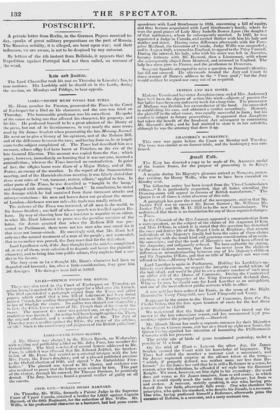LIBEL—HENRY HUNT VOWS THE TIMES.
Mr. Hunt, member for Preston, prosecuted the Times in the Court of Exchequer for a libel on his character, and the case was tried on Thursday. The honourable gentleman was his own client. He spoke of the cause as being one that affected his character, his property, and his life. He professed himself to be a great admirer of the liberty of the press, but not of its licentiousness, in very nearly the same terms used by Sir James Scarlett when prosecuting the late Morning Journal. He went on to give a history of his opinions, and of the Reform Bill, and of the difference between the two; and having done so, he at length came to the subject complained of. The Times had described him as a recreant, whose effigy had been burnt at Peterloo, on the eve of the late General Election. This account was copied from the Sun ; which paper, however, immediately on learning that it was not true, inserted a contradiction ; whereas the Times inserted no contradiction. In point of Eta, the effigies burnt were those of a Major Bliley, and of Mr. Potter, an enemy of the member. In the report of the Somersetshire meeting, and of the Harwich election meeting, it was falsely stated that there were cries of "rat, turncoat, traitor, villain," applied to him. In other parts of the Times, he was described as "bought in the lump," and charged with uttering "rank falsehood." In conclusion, he stated the damage which lie bad sustained from these incessant attacks and misrepresentations : his men and horses durst not go about the streets of London—his house was not safe—his trade was totally ruined.
The defence of the Times was intrusted, of all MC71 in the world, to Sir James Searlett ; one half of whose speech was levelled against Re- form. By way of showing how fara barrister is superior to an editor, in what Mr. Hunt laboured to prove was the peculiar vocation of the latter, Sir James asserted that when the Reform Bill was pre- sented to Parliament, there were not ten men who now voted for it that were not horror-struck. He sneeringly said, that Mr. Ihmt had only met the natural treatment of a man of the people ; and contended, that as no malice was proved, the Jury must find for the defendant.
Lord Lyndhurst said, if the Jury thought that the articles complained of, or any of them, were calculated to degrade and lower the plaintiff's character, and to bring him into public odium, they ought to find a ver- dict in his layoff.
The jury seem to Lave thought Mr. Hunt's character had been so degraded and lowered ; for, after a little consideration, they gave him WI. damages. The dameges were laid at 5,0001.


























 Previous page
Previous page